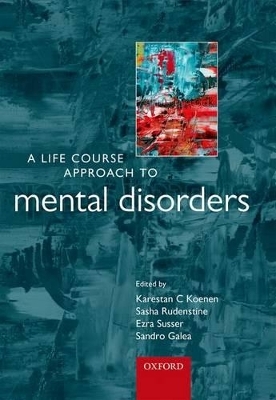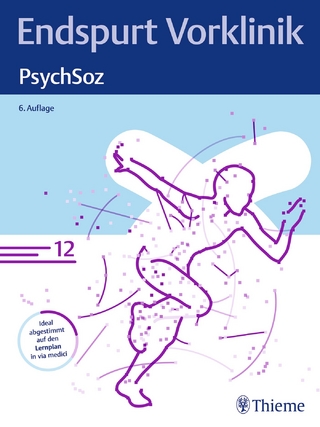
A Life Course Approach to Mental Disorders
Oxford University Press (Verlag)
978-0-19-965701-8 (ISBN)
A Life Course Approach to Mental Disorders examines the interplay of social and biological factors in the production of a wide range of mental disorders throughout life, from the peri-natal period through to old age.
The aging into adulthood of numerous birth cohorts, especially over the past twenty years, has provided increasing evidence that mental disorders previously perceived to emerge in adulthood may have their origins early in life. This book brings together, in a single resource, the research in life course epidemiology of mental disorders, forging a consensus on the current science and pointing the way forward for the field.
Assembling researchers across disparate disciplines including epidemiology, developmental psychopathology, psychiatric genetics, sociology, developmental cognitive neuroscience, and epigenetics the book reviews the methods and synthesizes existing knowledge about the life course epidemiology of mental disorders in populations. It also presents discussions of the mechanisms that drive the production of mental disorders over the life course including emerging areas of research in the field.
A Life Course Approach to Mental Disorders brings together the state-of-the-art science of life course epidemiology to inform training, research, practice and policy with regard to mental disorders. The first comprehensive articulation of a life course perspective in the area, it will be a key resource for academics, researchers and students.
Dr. Koenen is a licensed clinical psychologist and epidemiologist. She is currently an Associate Professor of Epidemiology at Columbia's Mailman School of Public Health where she leads the Psychiatric and Neurological Epidemiology program. Her work uses a developmental approach to examine the interplay of genetic and environmental factors in the etiology of stress-related mental disorders, such as posttraumatic stress disorder and depression. For this work, she was awarded the Chaim Danieli Young Professional Award from the International Society for Traumatic Stress Studies and the Robins-Guze Young Investigator Award from the American Psychopathological Association. She has published over 170 scientific papers and co-authored several books including Treating Survivors of Childhood Abuse: Psychotherapy for the Interrupted Life with Drs. Marylene Cloitre and Lisa Cohen. Dr. Rudenstine is an early-career investigator. She is interested in how genetic and environmental factors affect the manifestation of psychopathology over the life course and in how determinants at multiple levels - individual, network, and community - influence the prevalence, trajectories, and treatment of mental disorders globally. She received her Ph.D. in Clinical Psychology from City University of New York. Ezra Susser is Professor of Epidemiology and Psychiatry at Columbia University. He is Director of the Imprints Centre for Genetic and Environmental Lifecourse Studies, and co-founder of the Global Mental Health Program at Columbia University. Much of his work has focused on neurodevelopmental disorders (ND) across the life course, including but not limited to autism and schizophrenia. He has studied early origins and prevention of ND, cross cultural differences in incidence and course of ND, improvement of mental health research and services for individuals with ND in low- and middle-income countries, and improvement of services for the most disadvantaged individuals with ND in high-income settings such as New York City. He is lead author of the only contemporary textbook (i.e. not edited chapters) on psychiatric epidemiology; won the 2011 Rema LaPousse Award for outstanding contributions in psychiatric epidemiology; and was in 2012 President of the American Psychopathological Association. Dr Galea is a physician and an epidemiologist. He is the Anna Cheskis Gelman and Murray Charles Gelman Professor and Chair of the Department of Epidemiology at the Columbia University Mailman School of Public Health. Dr Galea's research program seeks to uncover how determinants at multiple levels including policies, features of the social environment, and genetic factors-jointly influence the health of urban populations. His work has documented the mental health consequences of mass trauma and conflict worldwide, including Hurricane Katrina, and the American wars in Iraq and Afghanistan. Dr Galea has published more than 400 scientific journal articles, 50 chapters and commentaries, and 7 books. Dr Galea serves as chair of the Community Services Board of the New York City Department of Health and Mental Hygiene and on the New York City Health Board. He is also president of the Society for Epidemiologic Research and a member of the Institute of Medicine of the National Academies of Science.
PART ONE: INTRODUCTION ; 1. Life course approaches to mental illness: The emergence of a concept ; PART TWO: METHODS IN LIFE COURSE APPROACHES ; 2. Study designs ; 3. Measurement issues in limited or longitudinal epidemiological studies of origins and/or course of psychiatric disorders ; 4. Analytic considerations in a life course perspective ; 5. Age, birth cohort, and period effects in psychiatric disorders in the United States ; PART THREE: LIFE COURSE APPROACH TO SPECIFIC MENTAL DISORDERS ; 6. Schizophrenia and related psychosis ; 7. Bipolar disorder ; 8. Applying a life course perspective to depression ; 9. Life course epidemiology of anxiety disorders ; 10. Epidemiology of posttraumatic stress disorder ; 11. Life course approach to substance use ; 12. The life course perspective: A framework for autism research ; 13. Life course epidemiology of eating disorders ; 14. ADHD over the life course ; 15. Conduct disorder across the life course ; 16. Borderline, schizotypal, avoidant, obsessive compulsive, and other personality disorders ; PART FOUR: UNDERSTANDING MECHANISMS ; 17. Cognitive function over the life course ; 18. Life course approaches to genetic epidemiology of mental illness ; 19. Impact of early environmental exposures on mental disorders across the life course ; 20. The role of the social environmental over the life course in the etiology of psychiatric disorders ; 21. Social context and mental health over the life course ; 22. Epigenetic influences on mental illness over the life course ; 23. Adverse childhood experiences and brain development: Neurological mechanisms linking the social environment to psychiatric disorders ; 24. Social-biological interplay over the life course ; PART FIVE: NEW DIRECTIONS IN THE LIFE COURSE EPIDEMIOLOGY OF MENTAL ILLNESS ; 25. Intergenerational transmission ; 26. Mental disorders and the emergence of physical disorders ; PART SIX: CONCLUSIONS ; 27. Public health, policy, and practice: Implications of life course approaches to mental illness
| Erscheint lt. Verlag | 17.10.2013 |
|---|---|
| Verlagsort | Oxford |
| Sprache | englisch |
| Maße | 174 x 245 mm |
| Gewicht | 522 g |
| Themenwelt | Medizin / Pharmazie ► Gesundheitswesen |
| Medizin / Pharmazie ► Medizinische Fachgebiete ► Psychiatrie / Psychotherapie | |
| Studium ► 1. Studienabschnitt (Vorklinik) ► Med. Psychologie / Soziologie | |
| Studium ► 2. Studienabschnitt (Klinik) ► Humangenetik | |
| Studium ► Querschnittsbereiche ► Epidemiologie / Med. Biometrie | |
| Studium ► Querschnittsbereiche ► Prävention / Gesundheitsförderung | |
| Naturwissenschaften ► Biologie ► Zoologie | |
| ISBN-10 | 0-19-965701-7 / 0199657017 |
| ISBN-13 | 978-0-19-965701-8 / 9780199657018 |
| Zustand | Neuware |
| Informationen gemäß Produktsicherheitsverordnung (GPSR) | |
| Haben Sie eine Frage zum Produkt? |
aus dem Bereich


